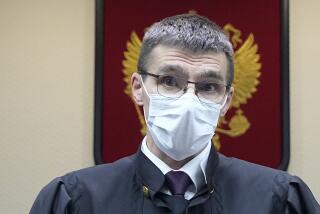Moscow Strikes Down Estonian Vote Law
- Share via
MOSCOW — The Soviet Union’s top state body Wednesday declared unconstitutional a restrictive voting-rights law that has provoked strikes by thousands of ethnic Russian workers in Soviet Estonia, an action that could rekindle a conflict between the central government and local Estonian authorities.
The Presidium of the Supreme Soviet, the executive body of the Soviet national legislature, gave the Estonian legislature two weeks to revise the law, adopted Aug. 8. It limits the right to vote in local elections to residents of at least two years standing, and thus disenfranchises recent Russian immigrants.
Last year, Estonia adopted a constitutional amendment declaring its sovereign right to override legislation emanating from Moscow. The Presidium later rejected that assertion, but the Estonians have refused to alter their stance, and the issue of which laws take precedence in the Baltic republic has never been formally settled.
The Soviet news agency Tass reported that the Presidium pronounced the Estonian law to be “at variance” with the Soviet constitution and with international human-rights conventions ratified by Moscow. Later, in a nationally televised airing of the Presidium session, Soviet Vice President Anatoly I. Lukyanov declared that “the amendments of the legislation on elections adopted in Estonia are unacceptable to us, not only juridically but also politically. They lead to the aggravation of inter-ethnic and social relations.”
Lukyanov noted that the Soviet constitution guarantees all citizens equal rights, irrespective of their place of birth or residence. He said that it was impermissible for one of the Soviet Union’s 15 constituent republics to adopt legislation that ran counter to the constitution that governs them all.
Signed by Gorbachev
Lukyanov chaired the Presidium meeting in the absence of President Mikhail S. Gorbachev, who nevertheless signed the Presidium ruling, Tass said.
As the strikes by Russian workers entered their second week, Estonian authorities have come under increasing pressure to settle the dispute, which has shut down scores of factories and other workplaces and severely hampered public transit services in the Baltic republic. There were growing signs that the disruption could spread to other Soviet republics where ethnic Russians have also complained about discriminatory election and language laws.
Organizations representing the Russian minority in the Baltic republic say the new law could remove the right to vote from up to a quarter of the 450,000 Russians living in Estonia, whose total population is about 1.6 million.
Estonians have maintained the law is necessary to ensure they retain political control of their homeland and are not overwhelmed by an influx of other ethnic groups drawn by Estonia’s higher living standards, and a redrafting of the law would mark a major retreat for Estonia’s Communist leadership. Estonian Communist Party chief Vaino Valjas, who has made strenuous attempts to win the trust of the Estonian majority, said earlier this week that the law would not be changed.
Estonian authorities have already revoked a decree issued last week in which they declared the Russian workers’ strike illegal.
The controversy over the election law has given the Kremlin a useful pretext for reasserting its authority over Estonia, the republic that has done the most to test the limits of Gorbachev’s reform program. Tass said that the Presidium had taken into account a proposal by the Estonian leadership to redraft the election law by Oct. 1 to bring it into line with the Soviet constitution. Leaving open the possibility of compromise, the Presidium refrained from simply declaring the Estonian law null and void.
Strike leaders in Estonia claim that at least 20,000 workers are now taking part in the walkout. Tass reported that more than 2,000 freight cars are waiting to be unloaded.
More to Read
Sign up for Essential California
The most important California stories and recommendations in your inbox every morning.
You may occasionally receive promotional content from the Los Angeles Times.













